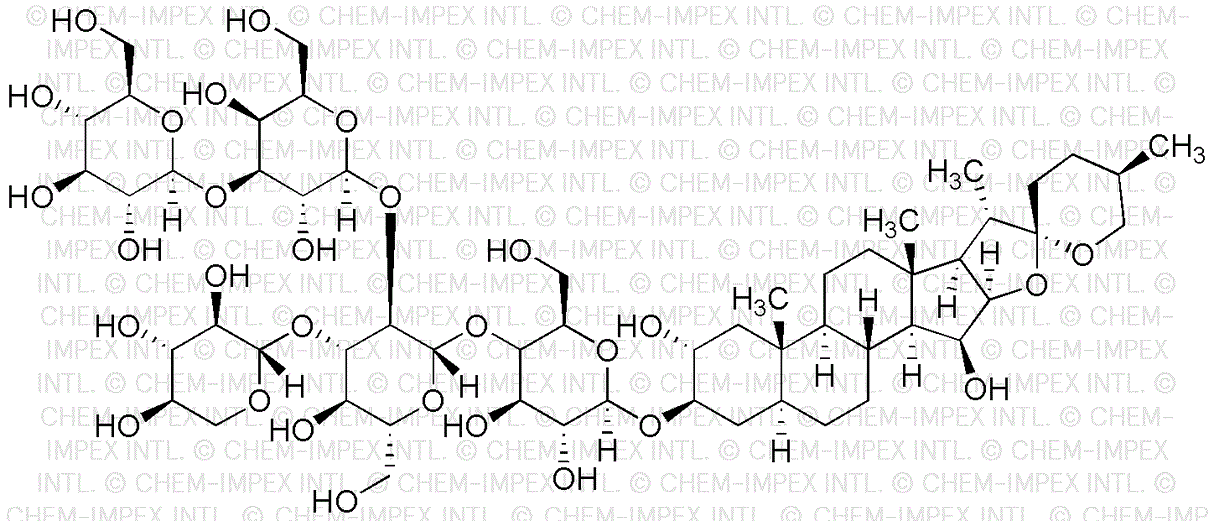Digitonin is widely utilized in research focused on:
- Biochemical Research: It is commonly used as a tool for studying membrane proteins and their interactions, particularly in the isolation and purification of membrane-bound enzymes.
- Pharmaceutical Applications: Digitonin serves as a natural detergent in drug formulation, enhancing the solubility and bioavailability of poorly soluble compounds, which is crucial in developing effective medications.
- Cell Biology: Researchers employ digitonin to selectively permeabilize cell membranes, allowing for the study of intracellular processes without disrupting overall cell integrity.
- Analytical Chemistry: It is used in assays to quantify cholesterol levels in biological samples, providing a reliable method for assessing lipid metabolism and related health conditions.
- Plant Research: Digitonin helps in extracting and analyzing chlorophyll and other pigments from plant tissues, aiding in studies related to photosynthesis and plant health.
General Information
Properties
Safety and Regulations
Applications
Digitonin is widely utilized in research focused on:
- Biochemical Research: It is commonly used as a tool for studying membrane proteins and their interactions, particularly in the isolation and purification of membrane-bound enzymes.
- Pharmaceutical Applications: Digitonin serves as a natural detergent in drug formulation, enhancing the solubility and bioavailability of poorly soluble compounds, which is crucial in developing effective medications.
- Cell Biology: Researchers employ digitonin to selectively permeabilize cell membranes, allowing for the study of intracellular processes without disrupting overall cell integrity.
- Analytical Chemistry: It is used in assays to quantify cholesterol levels in biological samples, providing a reliable method for assessing lipid metabolism and related health conditions.
- Plant Research: Digitonin helps in extracting and analyzing chlorophyll and other pigments from plant tissues, aiding in studies related to photosynthesis and plant health.
Documents
Safety Data Sheets (SDS)
The SDS provides comprehensive safety information on handling, storage, and disposal of the product.
Product Specification (PS)
The PS provides a comprehensive breakdown of the product’s properties, including chemical composition, physical state, purity, and storage requirements. It also details acceptable quality ranges and the product's intended applications.
Certificates of Analysis (COA)
Search for Certificates of Analysis (COA) by entering the products Lot Number. Lot and Batch Numbers can be found on a product’s label following the words ‘Lot’ or ‘Batch’.
*Catalog Number
*Lot Number
Certificates Of Origin (COO)
This COO confirms the country where the product was manufactured, and also details the materials and components used in it and whether it is derived from natural, synthetic, or other specific sources. This certificate may be required for customs, trade, and regulatory compliance.
*Catalog Number
*Lot Number
Safety Data Sheets (SDS)
The SDS provides comprehensive safety information on handling, storage, and disposal of the product.
DownloadProduct Specification (PS)
The PS provides a comprehensive breakdown of the product’s properties, including chemical composition, physical state, purity, and storage requirements. It also details acceptable quality ranges and the product's intended applications.
DownloadCertificates of Analysis (COA)
Search for Certificates of Analysis (COA) by entering the products Lot Number. Lot and Batch Numbers can be found on a product’s label following the words ‘Lot’ or ‘Batch’.
*Catalog Number
*Lot Number
Certificates Of Origin (COO)
This COO confirms the country where the product was manufactured, and also details the materials and components used in it and whether it is derived from natural, synthetic, or other specific sources. This certificate may be required for customs, trade, and regulatory compliance.

